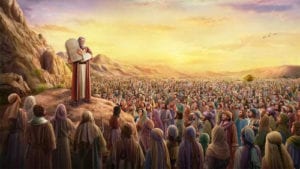
Catechism Lesson 9: The Ten Commandments (Part 2)
The Second Commandment: You shall not take the name of the Lord your God in vain.
In the bible, the name of the Lord is praised, blessed and glorified (Read Zechariah 2:13, Psalm 29:2, Psalm 96:2, Psalm 113:1-2). Therefore, we must not abuse the name of the Lord, because the name of the Lord is holy. The Second Commandment forbids the abuse of God’s holy name, or lying under an oath using God’s name, or breaking a vow to God. The sin of blasphemy is a grave sin which consists of uttering words of hatred, reproach or defiance against God. The sin of blasphemy also extends to the Blessed Virgin Mary and the saints.
The Third Commandment: Remember to keep holy the sabbath day.
The bible tells us that after God created heaven and earth in six days, He blessed the seventh day and made it holy, because on that day, He rested from all the work He had done in creation. (Genesis 2:3) For Jews, the Sabbath day begins on Friday evening and ends on Saturday evening. For Christians, Sunday is the fulfillment of the Sabbath day, because it is the day of Christ’s Resurrection from the dead; therefore, Sunday is appropriately called the Lord’s Day. Christians worship God outwardly, visibly, publicly and regularly on the Lord’s Day.
The Eucharist is celebrated on Sunday according to apostolic tradition. On Sundays and other holy days of obligation, Catholics are obligated to participate in the Mass, unless one has a valid excuse; for example: serious illness or accident. It is a mortal sin not to attend Mass on Sundays and holy days of obligation without a valid reason. On Sundays and other holy days of obligation, the faithful are obliged to refrain from engaging in work or activities that hinder the worship owed to God, the joy proper to the Lord’s Day, the performance of works of mercy, and the appropriate relaxation of mind and body. (2185) At the same time, we should also avoid making unnecessary demands on others that would hinder their observance of the Lord’s Day. (2195)
The Fourth Commandment: Honor your father and mother.
The Fourth Commandment addresses children in regards to their relationship with their father and mother. It also requires honor, affection and gratitude towards elders and ancestors. It extends to students and their relationship with teachers, employees to employers, subordinates to leaders, citizens to their country and government leaders. (2199)
As long as children live at home with their parents, they should obey their parents in all that they ask when it is for their good or for the good of the family. (2217) As they grow up, children should continue to respect their parents. They should also anticipate their parents’ wishes, seek their advice and accept their just admonitions. (2217) As much as they can, grown children must give their parents material and moral support in old age, and in times of illness, loneliness or distress. (2218)
The Fifth Commandment: You shall not kill.
The Fifth Commandment forbids direct and intentional killing of self and others, including murder, abortion, euthanasia and suicide. Human life is sacred because it is created by God and it remains forever in a special relationship with God the Creator. God alone is the Lord of life from its beginning until its end; no person other than God can claim for himself the right to claim the life of a human being. (2258)
It is legitimate to insist on one’s own right to life. Someone who defends his life and that of others is not guilty of murder even if he is forced to kill his aggressor. (2264) Legitimate authorities also have the right to use arms to protect and defend the civil community entrusted to their responsibility. (2265)
Questions:
- True or False. It is okay for people to swear and to abuse the name of God.
- True or False. Feeling lazy is a valid reason not to go to Mass on Sunday.
- True or False. According to the Fourth Commandment, we should help our parents in their old age.
- True or False. Abortion and euthanasia are grave sins against the Fifth Commandment.
- True or False. Legitimate authorities like the police do not have the right to use arms in order to protect the community.